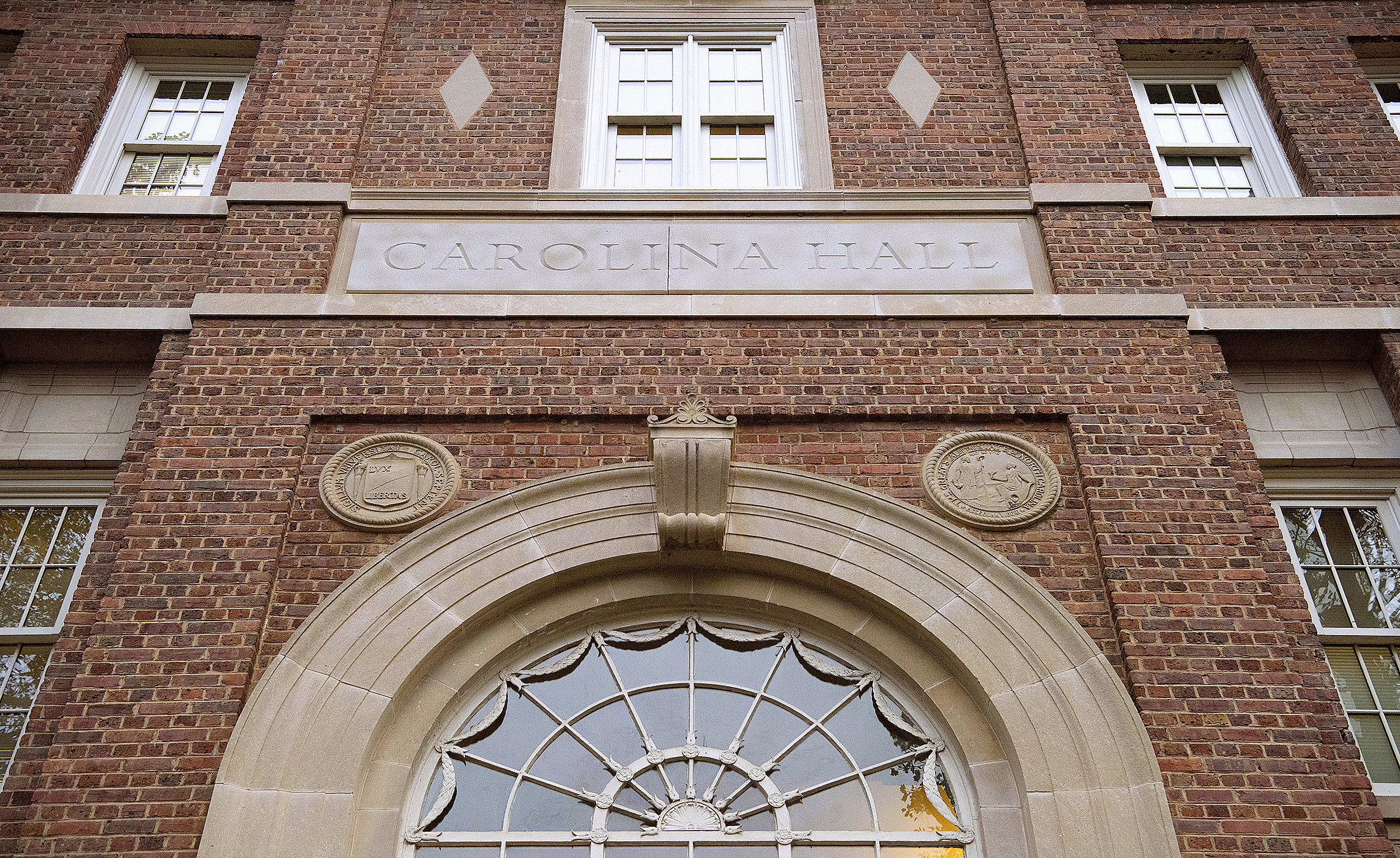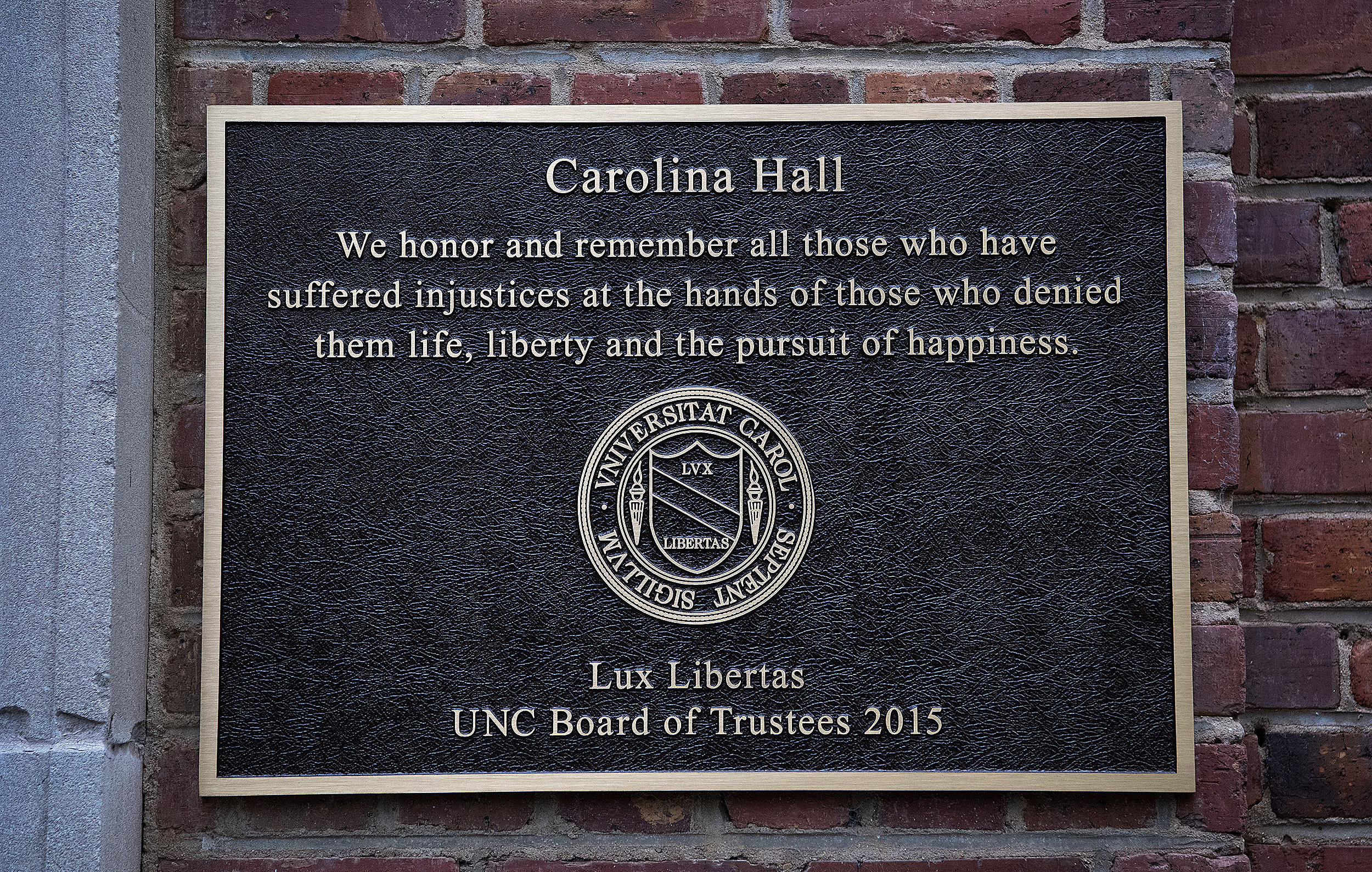Petition Asks End to Renaming Freeze
Posted on Feb. 3, 2020
The petition comes three weeks after Chancellor Kevin Guskiewicz unveiled his Commission on History, Race and a Way Forward, a multiyear effort to research, curate and teach about Carolina’s racial past. (UNC/Jon Gardiner ’98)
Six UNC professors have circulated a petition that seeks to overturn the Board of Trustees’ 2015 decision to place a 16-year moratorium on renaming campus buildings.
The petition comes three weeks after Chancellor Kevin Guskiewicz unveiled his Commission on History, Race and a Way Forward, a multiyear effort to research, curate and teach about Carolina’s racial past.
“This moratorium was unwise at the time it was imposed, and it now promises to vex the work and the chances of success of an important campus commission examining the university’s racial history and future,” the petition says. “The Board should rescind the moratorium in order to remove the cloud of complexity and confusion it has placed over the campus’s consideration of important matters about race and history.”
It continued: “Giving [the commission] every chance to succeed should, at a minimum, entail the removal of arbitrary restrictions on what the Commission may and may not recommend. … The Commission should not have to labor under doubts about the permissibility of potential solutions or the excessive time required for possible implementation. No suggestion from a Commission member should risk immediate dismissal based on trivial rules imposed by previous iterations of the Board of Trustees.”

Saunders Hall, named for Ku Klux Klan leader William Saunders (class of 1854), was renamed Carolina Hall as part of the trustees’ 2015 vote. (UNC/Jon Gardiner ’98)
The petition, which had just short of 100 signatures by midafternoon Monday, asks Guskiewicz to put the issue on the trustees’ agenda. Their next meeting is scheduled for March 25-26.
The moratorium, which as it stands would last until 2031, was part of the trustees’ vote to remove the name of William Saunders (class of 1854) from a classroom building because of his leadership of the Ku Klux Klan in North Carolina. In the same meeting, the trustees ordered placement of historical markers at strategic points on the campus that would explain the racial history. A task force worked on that effort for three years, and an elaborate display in the lobby of the former Saunders Hall (renamed Carolina Hall) represents that charge, but issues surrounding the Confederate monument saga delayed the additional markers.
The new commission is intended to be a continuation of that effort.
The moratorium was intended to allow the University time to develop new education initiatives and evaluate their effectiveness. Lowry Caudill ’79, then chair of the board, said the trustees were trying to create a stable environment so the University could develop new programs and teach Carolina’s history.
“Sixteen years is a small time in the history of an institution like this,” Caudill said. “We’ll be here 200 years from now. So 16 years to pause and get this right, we thought was an appropriate thing to do.”
The petition says that the moratorium was severely criticized at the time it was enacted.
“To rescind the moratorium is not to issue an immediate invitation to the renaming of buildings and other spaces. The Board of Trustees always retains its authority to make final and binding determinations about such things. What rescinding the moratorium will do is remove artificial restrictions on intellectual inquiry and on the free and frank discussion of approaches to reconciling with our past and building our future.”
The signatories are Malinda Maynor Lowery ’02 (MA, ’05 PhD), history professor and director of the Center for the Study of the American South; law professor Eric L. Muller; Michelle Robinson, associate professor and associate chair of the department of American studies; Karla Slocum, anthropology professor and director of the Institute of African American Research; William Sturkey, an assistant professor of history; and Erika K. Wilson, an associate professor of law.

UNC removed a plaque at Kenan Memorial Stadium that included the name of William Rand Kenan Sr. (class of 1864), because of his involvement in the racist insurrection in Wilmington in 1898. (Photo by Grant Halverson ’93)
The University has a number of buildings whose namesakes have been tied to white supremacy. The campus libraries website once published a list of 10 and now publishes all the names, with biographies that include that information at museum.unc.edu/exhibits/show/names.
Undergraduates in a history course in 2015 identified 22 buildings named for people with ties to slavery or white supremacy at UNC.
The former Saunders Hall is the only one whose name has been changed. UNC also has removed a plaque at Kenan Memorial Stadium that included the name of William Rand Kenan Sr. (class of 1864), because of his involvement in the racist insurrection in Wilmington in 1898; in fall 2018, then-Chancellor Carol L. Folt announced that UNC would refocus the dedication of the stadium from Kenan Sr. to William Rand Kenan Jr. (class of 1894), who contributed the majority of the funds to construct the stadium and dedicated it to his parents in 1927.
Duke University, East Carolina University and UNC-Greensboro have erased the name of former Gov. Charles Brantley Aycock (class of 1880) over his white supremacist views on education and voting rights. Aycock’s name remains on a residence hall at Carolina.
